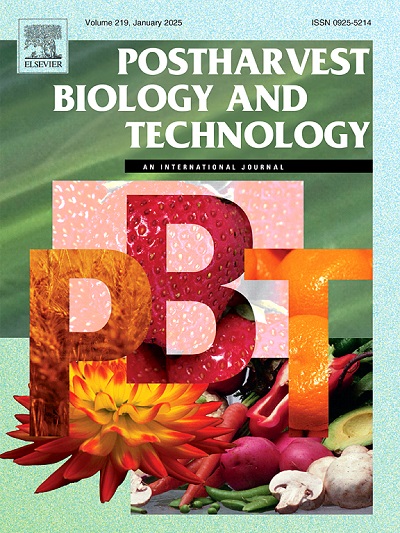Development and feasibility of an approach utilizing modified atmosphere packaging (MAP) and ethylene scrubbing to allow extended international transport and marketing of tree-ripe mangos
IF 6.4
1区 农林科学
Q1 AGRONOMY
引用次数: 0
Abstract
The feasibility of incorporating modified atmosphere packaging (MAP) technology with or without ethylene scrubbing into existing mango international transport and marketing systems was evaluated as a way to allow the shipment of tree-ripe fruit to improve the quality of mangos available to consumers in the destination countries. In preliminary research, the optimum atmospheres (low O2; high CO2) for slowing ‘Tommy Atkins’ and ‘Keitt’ mango ripening beginning at the tree-ripe (half ripe) developmental stage were determined using controlled atmosphere (CA). BreatheWay® MAP and RYPENtm ethylene control systems were then custom designed for us by the companies based on the results of the CA experiments. The preliminary research established that tree-ripe mangos (Stage 3.0–3.5 on a 1–5 scale) can be stored as low as 7 °C for 4 weeks without showing chilling injury (CI) symptoms or deterioration of fruit internal quality when held at a minimum 4 kPa O2 (‘Keitt’) or 6 kPa O2 (‘Tommy Atkins’) plus 5–10 kPa CO2. The MAP attained atmospheres similar to the optimum CA (average values of 6 kPa O2 + 9 kPa CO2 for both cultivars) for 4 weeks of storage at 7 °C. Ethylene scrubbing reduced ethylene concentration inside the MAP from 1.03 μL/L to 0.16 μL/L during storage at 7 °C. The MAP and ethylene scrubbing resulted in desired quality attributes (reduced CI, lenticel discoloration, and decay, plus higher fruit firmness and titratable acidity, and better organoleptic traits including acidity and overall eating quality) of tree-ripe mangos of both cultivars during ambient temperature (20 °C) shelf life. To summarize, MAP and ethylene scrubbing, alone or in combination, slowed down ripening related softening, color changes, and losses of sugars and acids, while sensory panelists rated the treated fruit as exhibiting higher overall eating quality than the control, which were overripe. Our results lead us to recommend BreatheWay® MAP and RYPENtm technology or their equivalent for long distance (4-week) shipping if the goal is to export/import tree-ripe mangos.
求助全文
约1分钟内获得全文
求助全文
来源期刊

Postharvest Biology and Technology
农林科学-农艺学
CiteScore
12.00
自引率
11.40%
发文量
309
审稿时长
38 days
期刊介绍:
The journal is devoted exclusively to the publication of original papers, review articles and frontiers articles on biological and technological postharvest research. This includes the areas of postharvest storage, treatments and underpinning mechanisms, quality evaluation, packaging, handling and distribution of fresh horticultural crops including fruit, vegetables, flowers and nuts, but excluding grains, seeds and forages.
Papers reporting novel insights from fundamental and interdisciplinary research will be particularly encouraged. These disciplines include systems biology, bioinformatics, entomology, plant physiology, plant pathology, (bio)chemistry, engineering, modelling, and technologies for nondestructive testing.
Manuscripts on fresh food crops that will be further processed after postharvest storage, or on food processes beyond refrigeration, packaging and minimal processing will not be considered.
 求助内容:
求助内容: 应助结果提醒方式:
应助结果提醒方式:


